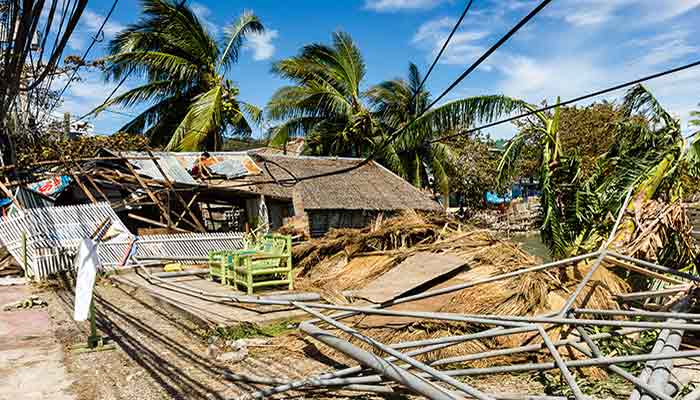web-cyclone_shutterstock_162222851.jpg

Cyclone damage
Almost four years ago, the South Pacific islands nation of Vanuatu was hit by Cyclone Pam, a huge storm with wind speeds of up to 250 kilometres an hour.
Half the population – 132,000 people – were affected. The cost of the damage was $450 million – 60% of GDP. Vanuatu President Baldwin Lonsdale said the storm had “wiped out” all recent development and the country would have to rebuild “everything”.
Cyclone Pam has long since disappeared from the news, but the cost of rebuilding has remained. Because Vanuatu did not get enough grants to pay for reconstruction, much of the cost has been paid for through government borrowing.
In the years since the cyclone, Vanuatu’s government debt has almost doubled. The IMF says the main reason is the cost of rebuilding from the storm.
Cyclone Pam was the second strongest storm in the South Pacific on record, and scientists predict damage from tropical storms across the world will increase due to climate change.
Small impoverished states like Vanuatu are particularly vulnerable to climate change. But they are not responsible for causing the problem. Twenty-nine small island states with 0.7% of the global population are together responsible for just 0.2% of global carbon dioxide emissions.
When hit by disasters such as tropical storms small states are forced to take on debt. The IMF conducts debt assessments for 21 impoverished small states. Of these, two are in debt default, 11 are at high risk of default, eight at medium risk and none at low risk.
Scientists say that the strength of tropical storms has already increased in recent decades, and they are expected to get even more damaging as global temperatures increase. High debts prevent countries from investing in ways to limit the damage from these disasters. Unless the international community acts, debts will continue to increase after each disaster hits.
‘We urgently need policies to stop climate disasters leading to debt burdens which undermine the meeting of human rights, basic needs and the Sustainable Development Goals.’
When disaster does arrive, the damage can be long term. The Caribbean island of Grenada used to be known as a major exporter of nutmeg. Then in 2004 it was hit by Hurricane Ivan, which toppled nutmeg trees across the island. Nutmeg exports fell from 2.5 million kgs a year before the hurricane, to just 0.35 million kgs after. And because of the time it takes for nutmeg trees to mature, by 2016, Grenada was still only exporting 0.85 million kgs.
One solution being proposed by international institutions and the global insurance industry is for vulnerable countries to buy disaster insurance. However, this puts the costs back on the victims of climate change, through insurance premiums, rather than those who cause it.
Furthermore, insurance is a highly inefficient use of resources. Jubilee Debt Campaign has found that one scheme in the Caribbean, the CCRIF SPC, has received $293 million in premium payments and grants from donors since it began in 2007, but has paid out just $131 million in claims. In contrast, $105 million from the scheme has gone to private insurance companies as profit.
Many affected countries are calling for action to help tackle their vulnerability. Earlier this year Keith Mitchell, Prime Minister of Grenada, and Gaston Browne, Prime Minister of Antigua and Barbuda, said:
“As climate change gets worse, we urgently need a new system for fast and effective debt relief when disasters hit.”
We urgently need policies to stop climate disasters leading to debt burdens which undermine the meeting of human rights, basic needs and the Sustainable Development Goals. This includes a comprehensive debt relief scheme for small states to get debt down to a sustainable level to allow for better preparedness ahead of disasters hitting, as well as a permanent, effective, automatic debt relief process in response to disasters.
As prime ministers Mitchell and Browne went on to say:
“Those who have contributed the most to climate change are the real debtors and it is, therefore, unfair that small island developing states, which are most vulnerable, like those in the Caribbean, be indebted as a result.”
Read more: ‘Don’t owe, shouldn’t pay: The impact of climate change on debt in vulnerable countries’.













